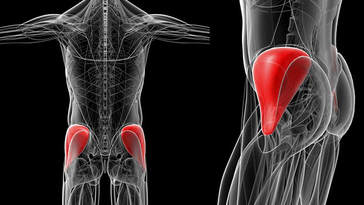|
Dr. Jenn Pratt  If you suffer from lower back, hip, knee or shoulder injuries, you could have Gluteal Amnesia. With the advent of technology, computers, smart phones, smart homes, cars and pretty much wireless everything, physical movement has taken the back seat to convenience. This is great for making life simpler and easier in many ways, but definitely has contributed to an an epidemic of inactivity. Like everything in life, there is a cost and the cost we often pay for convenience is a toll on our physical health. Ever heard that saying “if you don’t use it you lose it?” Well, this holds true for many things including your butt, aka glutes. So other than something that makes you want LMAO what the heck is Sleepy Butt syndrome/ Gluteal Amnesia? Basically, it is when the gluteal muscles forget what they need to do! The glutes (maximus, medius, and the minimus) are one of the largest prime movers of the human body, when working at full potential can pack quite the punch. In addition to filling out a nice pair of skinny jeans they help control the muscles of the hip and are excellent at force production. One of the main reasons they can begin to shut off is we spend so much time sitting and not nearly enough time utilizing them for what they were made for, such as running/ sprinting, thrusting, jumping etc so much so that they forget to stay turned on. They can also become inhibited when you have chronic low back pain which can lead to continuation of pain. Ever heard of muscle memory? Well your muscles have memory and through repetition it gets stronger. If you have consistent exercise program your muscles can quickly adapt and know how to react, but it you have a sedentary lifestyle they completely forget what to do! When you sit for long periods of time you are not using your glutes and this leads to the amnesia. This inactivity often causes muscle imbalances and tightness in the hip flexors which further cause an inhibition (turning off) of your glutes. This sedentary lifestyle leads to weakness and increased muscle tightness in your hips which will limit the range of motion of your hips, leading to misalignment and stress to your knees, low back, and even shoulder. Some of the common injuries resulting from gluteal amnesia are patellofemoral syndrome (PFS), iliotibial band syndrome (ITB), lumbar disc herniation, and even rotator cuff strains. How do you know if you may have Gluteal Amnesia? Some movement compensations that can indicate Gluteal Amnesia include:
How can you change this situation? Following these simple steps can return your gluteal memory and reduce pain and immobility.
Your chiropractor is an expert in human movement and function; if you are unsure of whether or not you may suffer from gluteal amnesia and what to do about it, come in for an assessment - we can help! References: Hughes, L. (2017, May 25). WTF Is 'Dead Butt Syndrome' and How to Know If You Have It, from https://www.self.com/story/what-is-gluteal-amnesia McGill, S. M. "The painful lumbar spine." IDEA Fitness J 7.1 (2010).
39 Comments
|
AuthorPosts inspired by the team at Platinum Health & Wellness. Archives
June 2025
Categories
All
|
|
 RSS Feed
RSS Feed